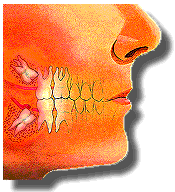|
|
 |
 |

As we all know, the last teeth that come out are wisdom teeth. They come out approximately at the age of 17-25. It is disputable if these teeth remain in the mouth or not. If these teeth come out in a right position and do not harm the tissues around, it can be kept in its place. The tooth which is joined to the jaw bone in an abnormal position (revealed by X-ray) is to be extracted in order to avoid future complications.
In what cases wisdom teeth must be extracted?
- DECAY: Saliva, bacteria and food debris gather in the hollow, made by a new tooth and put at risk both the wisdom tooth and the incisor beside it. It is difficult to determine and treat these decays. The complications causing inflammation and abscess can occur..
- GINGIVAL DISEASES (pericoronitis): Infection source consisting of bacteria and food debris occurs in the gingiva of the wisdom tooth which has come out incompletely. This situation causes smell, pain, swelling and trismus (inability to normally open the mouth). Infection can spread to the cheek and neck via lymph system.
- PRESSURE PAIN: If the wisdom tooth makes pressure on the neighboring teeth, it can cause pain. Sometimes this pressure can be the reason of erosion.
- ORTHODONTIC REASONS: Many young people receive orthodontic treatment to get rid of bending existing in teeth. When wisdom teeth come out, at the result of pressure it makes on the other neighboring teeth, there occurs mobility and it can increase bending.
- REASONS RELATED TO PROSTHESIS: When prosthesis is prepared, the wisdom teeth in the mouth must be taken into consideration. Because after extracting wisdom teeth, a new prosthesis will have to be made for a changed structure of the mouth.
- CYST: A tooth with retention can be the reason of cyst. The cyst can cause melting of bone, widening of jaw and dislocation of the existing teeth. In order to avoid melting of bone, the tooth must be extracted and the cyst must be cleaned. In rare cases cyst can spread into a wide area and can cause spontaneous breaks (have a look at Tooth Abscess)
If the wisdom teeth has a wrong position, but do not cause any pains, why this wisdom tooth must be extracted?
The wrong position of the tooth is a quite important reason for an infection. In this case problems will take place. In addition to all, such kind of problems occurs suddenly and unexpectedly.
- The wisdom teeth are located in the areas which are hard to be cleaned by a toothbrush or a dental floss. Bacteria, acid and food debris gather in this area. If the tooth decays and it is not restored by filling, it can be become inflamed soon.
- As it is hard to keep these tooth clean, the bacteria and food debris gathered there causes smell coming out of mouth.
- A tooth with retention underneath the gingiva transversally causes pressure resulting mobility, compression and bending of other teeth.
What time is most suitable for wisdom teeth?
The wisdom teeth must be extracted in the age of 14—22. The operations in young age technically are easier and get well soon. The operations after the age of 40 become difficult. With the age the risk of side effect and the period of healing increase.
Can a tooth be extracted if there is an active infection (pericoronitis)?
Often not. If a medical intervention takes place when there is an infection, the latter will spread around and the recovery of the wound will be long-termed and difficult. Infection can be taken under control with local oral hygiene, antibiotics and extraction of the wisdom tooth in the opposite jaw.
Is the extraction of wisdom tooth different from ordinary tooth extraction?
- Difficulty process of the procedure varies depending on the position, structure and size of the wisdom tooth.
- After the ordinary extraction there can be slight swelling, pain and bleeding. There also exist some complex extractions which need special measures.
- After this extraction there can be recovery problem called “dry socket”. Blood can gather in the extraction socket and cause pain. This problem disappears in some days. If all the recommendations of the doscotr are followed, these problems can be overleaped.
- As the age grows, bone becomes thicker and less elastic, because of it, extraction becomes more difficult and recovery long-termed.
After-operation care
- Wounded area must not be stirred. Otherwise there can be pain, infection and bleeding.
- During the first 24 hours noting must be chewed at that side.
- During the first 24 hours one must not smoke. Because smoking increases bleeding and prevents recovery.
- One must not spit. Otherwise bleeding will increase and clot of blood can be removed.
- Bleeding must be controlled. If there is no sewing, a tampon and sterile gauze can be put on it. In order to help the blood to coagulate, tampon must be kept in the mouth for a half an hour. If after extracting the tampon, bleeding continues, a new tampon must be put.
- Swelling must be controlled. After the operation cold tampon must be put on the wound to weaken the blood circulation and to prevent swelling. Tampon must be applied in two ways: for 20 minutes- cold tampon, break for 20 minutes, again tampon for 20 minutes.
- After the first 24 hours the oral cavity must be rinsed with warm salty water each two hours. This water is made by adding 1 spoon –full salt to a glass of water.
|